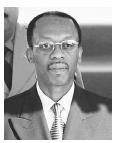HAITI
Jean-Bertrand Aristide
President

(pronounced "zhuhn BARE-trahnd air-ess-TEED")
"Power no longer resides with the bayonet but instead with the people's ballots."
The Republic of Haiti occupies the western third of the Caribbean island of Hispaniola, with a total area of 27,750 sq km (10,714 sq mi). The capital is Port-au-Prince, located in the southeastern region of the country. Haiti shares the island with the neighboring Dominican Republic. Cuba lies about 80 km (50 mi) to the west; the Bahamas are to the north. The population has been estimated at 7 million. Ninety-five percent of Haitians are of African descent; the other 5% are mixed African-Caucasian. Haiti is one of the world's most densely populated countries, with 277 people per sq km (717 per sq mi); 65% of Haitians live in rural areas. Roman Catholicism, the state religion, comprises 80% of the population, while Protestantism makes up 16%. Voodoo practice is widespread, and most Haitians see no conflict between religious faith and voodoo rituals and rites. The official languages are French, spoken by only about 20% of the people, and Creole, which is spoken universally. Only 20% of Haiti's territory is arable land. With nearly two-thirds of Haitians engaged in subsistence farming, the pressures on the land have been enormous and devastating. Deforestation and soil erosion have combined to diminish agricultural productivity to the point where Haiti cannot feed itself, relying instead on food imports and feeding programs for most of its people. Fewer than 10% of Haitians are employed in what little manufacturing takes place in the country. An estimated 60% of the work force is unemployed. Large-scale emigration of skilled workers has left Haiti with a potential work force with little or no education and few skills. Coffee, cocoa, mangoes, and essential oils make up the bulk of Haiti's exports, most of which are destined for the United States (75%). Per capita gross domestic product (GDP) has been estimated at US $1,700 (2001 est.). Inflation is 14%. Haiti's income distribution is among the most skewed in the world, with 90% of wealth controlled by less than 10% of the population. Haiti is the poorest country in the Western hemisphere and among the poorest in the world. The currency is the gourde .
ADDRESS
National Palace
Port-au-Prince
Haiti
Comment about this article, ask questions, or add new information about this topic: